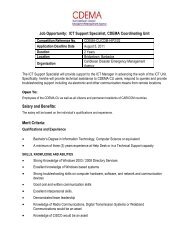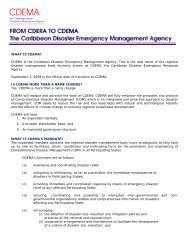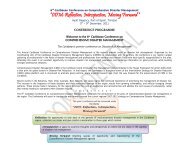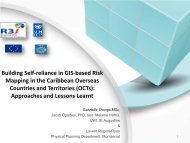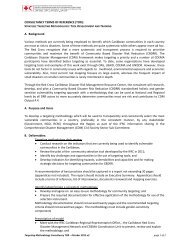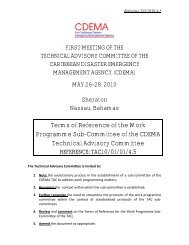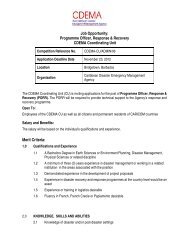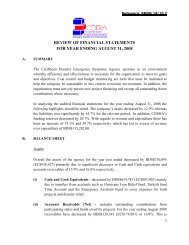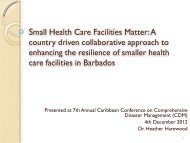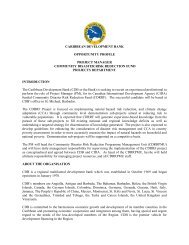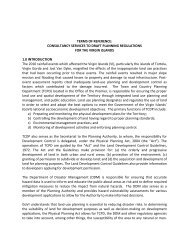Create successful ePaper yourself
Turn your PDF publications into a flip-book with our unique Google optimized e-Paper software.
project design and implementation. For example, community training programmes are developed based on<br />
capacity needs that community members have identified.<br />
e) Establishing or working with existing local governance mechanisms in communities<br />
The success of community-based programmes depends, in part, on good governance systems. The BDRC<br />
project in Jamaica is working with and through local government and parish structures to target 28<br />
communities. Jamaica’s local authorities and their Parish Disaster Coordinators are an important element of<br />
the project’s implementation arrangements, with key activities and some local level decision-making being<br />
done in association with and through them. Indeed, working with the guidance, buy-in and at the pace of<br />
personnel at this level has proven to be a critical factor in the smooth and uninterrupted roll-out in communities.<br />
The Red Cross National Societies are another important institutional mechanism for the roll out of DRR and<br />
CC programmes at community level. They have recently been placing greater emphasis on community level<br />
disaster preparedness, testing and applying different methods to support and implement local level<br />
interventions. As a consequence they add to the effectiveness of regional and national disaster management<br />
systems, whilst ensuring they are informed by, and are more responsive to, community needs and situations of<br />
vulnerability.<br />
The governance mechanism at the level of the community itself is also critical. In CANARI’s experience, it is<br />
almost always preferable to work with an existing community-based organisation than to try and establish a<br />
new one as the results tend to be evident earlier and prove more sustainable. However, whether the<br />
organisation is an established or a new one, there is likely to be a need for initial and ongoing identification and<br />
management of internal community conflicts (generally requiring an external, independent facilitator) and<br />
capacity building in aspects of organisational and project management. This has implications for the timeframe<br />
of any successful initiative and, in practice, there is often a mis-match between short donor project funding<br />
cycles and the desired long-term outcomes, resulting in disappointment and frustration for all parties.<br />
CANARI has found the use of mentors to be a particularly successful strategy in supporting the development of<br />
community-based organisations, particularly in the early stages when they may be developing proposals and<br />
implementing projects for the first time. It is also important to consider all the options available for structuring<br />
the organisation, rather than relying on the traditional, hierarchical structures with highly formal meetings that<br />
have been prevalent in the region and that tend to deter the participation of key stakeholders such as young<br />
people (and particularly young men) and those with low literacy levels or low self-esteem or confidence. If the<br />
initiative intends to have an entrepreneurial component, a for-profit or cooperative organisation may also be<br />
considered as an alternative or adjunct to a non-profit structure.<br />
f) Participatory monitoring and evaluation of community-based DRR and CC programmes<br />
Participatory monitoring and evaluation (PME) involves the local community, development agencies, local<br />
authorities and other stakeholders in measuring the progress made and the effectiveness of the processes<br />
employed, and in identifying the necessary follow-up actions to ensure that community vulnerability is<br />
consistently reduced. None of the current programmes in the region fully include this component. The Asian<br />
Disaster Preparedness Center (APDC) developed a Participant’s Workbook 4 on ‘Community-based Disaster<br />
Risk Management for Local Authorities’ which has a short module on ‘Monitoring and Evaluation’ (M&E), which<br />
provides an overview of what M&E is and some processes that can be used.<br />
M&E can be a costly exercise, contributing to the widespread failure to evaluate the long-term outcomes of<br />
programmes, projects, tools and methods (i.e. beyond the project timeframe) even though it is these long-term,<br />
sustained changes in knowledge, attitudes and behaviour that will be necessary for effective community<br />
4 Asian Disaster Preparedness Center, 2006. Participant’s Workbook: Community-based Disaster Risk Management for Local<br />
Authorities.<br />
5



